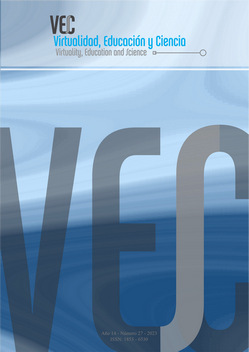Discord: an online learning tool for university students. A case study
Keywords:
information technology; Discord; higher education; teaching deviceAbstract
During the pandemic, new designs of pedagogical proposals emerged for the teaching-learning process by taking advantage of the new educational benefits available. Given the challenge that virtuality represents, this article collects the findings of a case study through an experience carried out with Moodle and Discord which allows us to describe the teaching process of programming through an analysis. Such research was carried out with a group of 40 students who were in their first year of the Bachelor's Degree in Computer Science in the subject called Paradigms of the Metropolitan University for Education and Work (UMET) during the second semester of 2021. In this article we analyze the didactic integration of this technology in interactive learning situations and the monitoring of students.
References
ARZUAGA, S., CASABLANCAS, S. y DARI, N. (2021). La pandemia, las universidades y las prácticas de evaluación. Virtualidad, Educación y Ciencia, 24(12), pp. 72-85.
BALL, M., DEORIO, A., HSIA, J. y BLANK, A. (2021). Teaching TAs to Teach: Strategies for TA Training. In Proceedings of the 52nd ACM Technical Symposium on Computer Science Education (SIGCSE '21) (pp. 461–462) Association for Computing Machinery. https://doi.org/10.1145/3408877.3432579
CABERO-ALMENARA, J. y LLORENTE-CEJUDO, C. (2020). Covid-19: transformación radical de la digitalización en las instituciones universitarias. Campus Virtuales, 9(2), pp. 25-34. http://www.uajournals.com/ojs/index.php/campusvirtuales/article/view/713/410
CABERO-ALMENARA, J. y VALENCIA, R. (2019). TIC para la inclusión: una mirada desde Latinoamérica. Aula Abierta, 48(2), pp. 139-146. doi:10.17811/rifie.48.2.2019.139-146.
DELGADO-GARCÍA, M., GARCÍA-PRIETO, F. y GÓMEZ HURTADO, I. (2017). Moodle y Facebook como herramientas virtuales didácticas de mediación de aprendizajes: opinión de profesores y alumnos universitarios. Revista Complutense de Educación, 29(3), 807-827. https://doi.org/10.5209/RCED.53968
EXPÓSITO, E. y MARSOLLIER, R. (2020). Virtualidad y educación en tiempos de COVID-19. Un estudio empírico en Argentina. Educación y Humanismo, 22(39), pp. 1-22. https://doi.org/10.17081/eduhum.22.39.4214
FORBES (27 marzo de 2021). Mientras los fundadores de Discord se acercan al estatus de multimillonarios, Microsoft buscan quedarse con la plataforma de chat. https://www.forbesargentina.com/negocios/de-adiccion-recaudar-us-118-millones-caras-detras-una-startup-furor-n9256
GONZÁLEZ MARIÑO, J. C. (2006). B-Learning utilizando software libre, una alternativa viable en Educación Superior. Revista Complutense De Educación, 17(1), pp. 121-133 https://revistas.ucm.es/index.php/RCED/article/view/RCED0606120121A
JOHNSON, M. C., SALETTI-CUESTA, L. y TUMAS, N. (2020). Emociones, preocupaciones y reflexiones frente a la pandemia del COVID-19 en Argentina. Ciência & Saúde Coletiva, 25, pp. 2447-2456. https://doi.org/10.1590/1413-81232020256.1.10472020
LITWIN, E. (2005). Tecnologías educativas en tiempos de Internet, Agenda educativa. Buenos Aires: Amorrortu.
MARÍN, V., RAMÍREZ, A. y SAMPEDRO, B. (2011). Moodle y estudiantes universitarios. Dos nuevas realidades del EEES. Profesorado. Revista de Curriculum y Formación del Profesorado, 15(1), pp. 109-120. Recuperado de http://hdl.handle.net/10481/15362
MOCK, K. (2019) Experiences using Discord as Platform for Online Tutoring and Building a CS Community. In Proceedings of the 50th ACM Technical Symposium on Computer Science Education (SIGCSE '19). Association for Computing Machinery, New York, NY, USA, 1284. DOI:https://doi.org/10.1145/3287324.3293769
MONJELAT, N., PERALTA, N. y SAN MARTÍN, P. (2021). Saberes y prácticas con TIC: ¿instrumentalismo o complejidad? Perfiles Educativos, 43(171) https://doi.org/10.22201/iisue.24486167e.2021.171.59225
MULJANA, P. S. y LUO, T. (2019). Factors contributing to student retention in online learning and recommended strategies for improvement: A systematic literature review. Journal of Information Technology Education: Research, 18, pp. 19-57. https://doi.org/10.28945/4182
MUÑOZ MARÍN, A. (2021). Twitch y Discord, nuevos medios acompañantes de la juventud española para paliar su soledad [Trabajo de fin de grado en periodismo, Universidad de Sevilla].
NUÑEZ NORAMBUENA, I. y BERGEL, A. (2021). Building a bot for automatic expert retrieval on discord. In Proceedings of the 5th International Workshop on Machine Learning Techniques for Software Quality Evolution (MaLTESQuE 2021), pp. 25–30. Association for Computing Machinery. https://doi.org/10.1145/3472674.3473982
PADILLA, A., ÁGUILA, A. y GARRIDO, A. (2015). Empleo de Moodle en los procesos de enseñanza-aprendizaje de dirección de empresas: nuevo perfil del estudiante en el EEES. Educación XX1, 18(1), pp. 125-146.
SÁNCHEZ, J., SÁNCHEZ, P. y RAMOS, F. (2012). Usos pedagógicos de moodle en la docencia universitaria desde la perspectiva de los estudiantes. Revista iberoamericana de educación, 60, pp. 15-38.
SURIAN, A. (2020). Educación, salud pública y gestión de las epidemias. ¿Qué lecciones nos está dejando? https://www.clacso.org/educacion-salud-publica-y-gestion-de-las-epidemias-que-lecciones-nos-esta-dejando/
VIZCAÍNO SANTIAGO, J. (2021). Plataformas y herramientas para la docencia telemática. Comparativa de dos plataformas para la docencia en línea en la Formación Profesional [Tesis de maestría, Universitat Politècnica de Catalunya].
Downloads
Published
Issue
Section
License

This work is licensed under a Creative Commons Attribution-NonCommercial 4.0 International License.
The generation of derivative works is allowed as long as it is not done for commercial purposes. The original work may not be used for commercial purposes.


